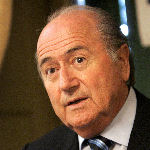FIFA President Joseph S. Blatter took questions on topics relating to the
2006 FIFA World Cup Germany? and general FIFA business as part of an information
meeting with more than 40 journalists from around the world.

FIFA President Joseph S. Blatter, pictured
during the round table event in Zurich on 19 May 2006.[AFP]
|
On the FIFA World Cup in Germany:
We must pay a huge compliment to the Germans. Everything that has been
achieved in Germany: the stadiums, the logistics, the telecommunications, is
simply superb. Ticketing will remain a hot topic right up until 9 July. All the
tickets will be sold. A short time ago, I had a conversation with Interior
Minister Wolfgang Sch?uble. He said: "We have to consider whether it will be
possible to maintain the strict security system right to the end. We have a
problem with security and access controls, as we want to avoid bottlenecks."
On the 15 May deadline for naming squads:
All the associations submitted their squad lists on 15 May, right on time. We
just had a couple of cases where the squad numbering wasn't clear.
On the subject of referees at the FIFA World Cup:
Our intention was to field teams of match officials who were all well
acquainted with each another. Referees are there to ensure a good game and
protect the players. That's why we tested all the teams ahead of the World Cup.
The lead referee was instructed to nominate three assistants, of whom two were
obliged to pass the tests. We ran physical and theory tests. We took a hard line
at these tests. If two assistants fail to pass the tests, the whole team is in
trouble.
The FIFA Disciplinary Committee will watch and analyse every match at the
World Cup, and intervene if there's something the referee didn't see. Referees
who fail strictly to apply interpretations made by the International FA Board
and FIFA, and the rules designed to protect the players, will be sent home.
On the withdrawal of Italian referee de Santis:
The Italian association took the initiative and withdrew the refereeing trio,
together with both members of the Referee's Committee. We won't replace that
team. We still have 22 teams and five reserve teams for the World Cup.
The investigations are currently ongoing in Italy, so he's to be considered
innocent until a verdict is pronounced. We're in close contact with everyone
involved, and we've been kept informed of developments.
On the question as to why the World Cup only features two refereeing teams
from Africa:
We have two referee teams and two reserve teams from Africa, so that's four
teams in total. We had to make a choice of 23 teams, now down to 22, from 45.
The evaluation showed we have the same quota as we do in Asia. It's another
thing altogether when we consider Mexico, which is providing two teams, because
Mexico has an exceptionally high standard of refereeing. The development of
refereeing techniques is more difficult in Africa, partly because we've been
unable to recruit teams for 2006 drawn from single nations.
On the problems in Italian football:
Calcio is the biggest thing around, stronger than any religion. We've been
provided with all the information we require by the Italian association.
Association President Franco Carraro asked us whether he should step down from
his UEFA and FIFA committees, but we told him he should continue to exercise his
offices in these cases.
On the subject of betting during the World Cup:
Everyone involved at the World Cup will sign a declaration promoting fair
play, rejecting racism and doping, and declaring that he and his family members
are not in any way whatsoever involved in gambling.
On racist incidents during the FIFA World Cup:
The Executive Committee has ratified a Disciplinary Code, summarising our
policy in a single document, available at FIFA.com. A team can be docked three
points, or six points for a repeat offence, in the event of racialist incidents
on the field. The policy will take effect from 1 July, but it should also apply
to the World Cup in Germany.
We have to tread extremely carefully in this matter. The spectators won't be
assigned to specific areas of the ground at the World Cup, so we can only punish
racialist activities which take place on the field of play, i.e. the things we
can control, the players and the coaching staff etc.
On social responsibility:
250 million people all over the world are directly involved in football, as
players, coaches, referees, and officials. Every single one has four or five
family members or friends who accompany them in some way. The worldwide movement
that is football thus encompasses more than a billion people, one-sixth of the
global population.
That means football has a responsibility to society, and we have to take it
seriously. That's why FIFA has established a special "Social Responsibility"
department. At the Congress in Munich, the Ethics and Fair Play Committee will
be re-constituted as the Committee for "Social Responsibility and Fair Play".
Ethical matters will be dealt with in a new, independent Ethics Committee.